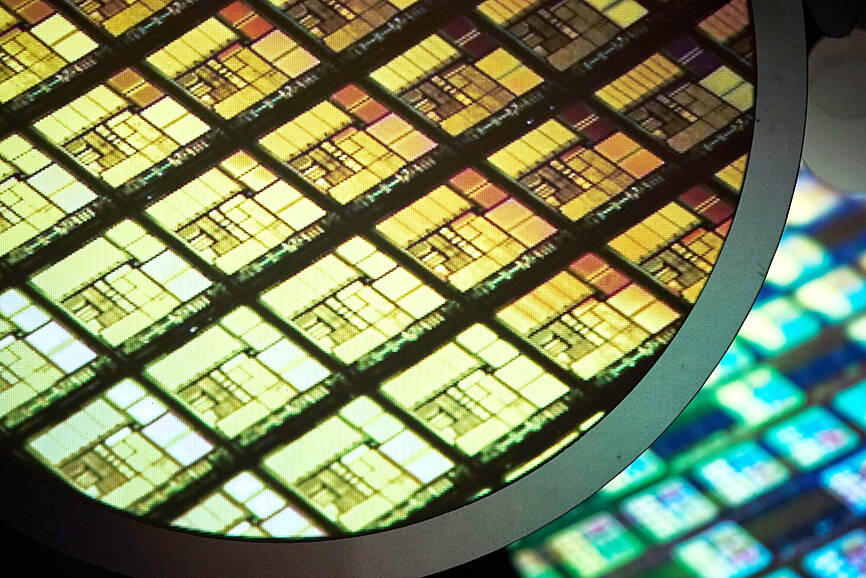The US Department of Commerce’s announcement that it would impose a fresh round of sanctions on exports to China by major US artificial intelligence (AI) chip designers is expected to harm suppliers, including those in Taiwan, analysts said on Wednesday.
The department this week announced new export licensing requirements for Nvidia Corp’s H20 and Advanced Micro Devices Inc’s (AMD) MI308 chips, which are critical to AI development.
The new US licensing requirements would further hamper Nvidia and AMD, while Taiwanese suppliers to the two companies would also be affected, Taiwan Industry Economics Services researcher Arisa Liu (劉佩真) said.

Photo: An Rong Xu, Bloomberg
The Taiwanese companies most likely to be affected include AI server makers such as Inventec Corp (英業達) and Mitac Holdings Corp (神達控股), which supply Chinese cloud service providers such as Baidu Inc (百度), Alibaba Group Holding Ltd (阿里巴巴) and Tencent Holdings Ltd (騰訊), local news reports said yesterday.
An industry expert, speaking on condition of anonymity, on Wednesday called the latest sanctions “ridiculous,” as the H20 and MI308 chips were designed to comply with US restrictions on exports to China.
China is unlikely to be heavily affected by the sanctions in the short term, as many Chinese buyers have reportedly built up large inventories of H20 and MI308 chips, the expert said.
The US’ move to further restrict chip exports to China would prompt Chinese chipmakers to speed up production of chips similar to those made in the US, they added.
Citing the example of Huawei Technologies Co’s (華為) Ascend 910B processor, which is close to Nvidia’s H20 in terms of efficiency, the expert said that such efforts could accelerate China’s progress toward semiconductor self-sufficiency.
Therefore, the sanctions are likely to bolster China’s chip industry, which would not only harm Nvidia and AMD, but also their Taiwanese suppliers, they said.
On Tuesday, Nvidia said it would book a quarterly charge of about US$5.5 billion tied to restrictions on exports of its H20 graphics processing units to China and other destinations, while AMD on Wednesday said it would see charges of about US$800 million related to the sales restrictions imposed on its MI308 units.
Nvidia CEO Jensen Huang (黃仁勳) yesterday said that China is an important market for Nvidia.
“We hope to continue to cooperate with China,” Huang said in a meeting with Ren Hongbin (任鴻斌), head of the China Council for the Promotion of International Trade, state broadcaster China Central Television reported.
Huang arrived in Beijing earlier in the day at the invitation of the trade organization.
Additional reporting by Reuters

UNCERTAINTY: Innolux activated a stringent supply chain management mechanism, as it did during the COVID-19 pandemic, to ensure optimal inventory levels for customers Flat-panel display makers AUO Corp (友達) and Innolux Corp (群創) yesterday said that about 12 to 20 percent of their display business is at risk of potential US tariffs and that they would relocate production or shipment destinations to mitigate the levies’ effects. US tariffs would have a direct impact of US$200 million on AUO’s revenue, company chairman Paul Peng (彭雙浪) told reporters on the sidelines of the Touch Taiwan trade show in Taipei yesterday. That would make up about 12 percent of the company’s overall revenue. To cope with the tariff uncertainty, AUO plans to allocate its production to manufacturing facilities in

TAKING STOCK: A Taiwanese cookware firm in Vietnam urged customers to assess inventory or place orders early so shipments can reach the US while tariffs are paused Taiwanese businesses in Vietnam are exploring alternatives after the White House imposed a 46 percent import duty on Vietnamese goods, following US President Donald Trump’s announcement of “reciprocal” tariffs on the US’ trading partners. Lo Shih-liang (羅世良), chairman of Brico Industry Co (裕茂工業), a Taiwanese company that manufactures cast iron cookware and stove components in Vietnam, said that more than 40 percent of his business was tied to the US market, describing the constant US policy shifts as an emotional roller coaster. “I work during the day and stay up all night watching the news. I’ve been following US news until 3am

COLLABORATION: Given Taiwan’s key position in global supply chains, the US firm is discussing strategies with local partners and clients to deal with global uncertainties Advanced Micro Devices Inc (AMD) yesterday said it is meeting with local ecosystem partners, including Taiwan Semiconductor Manufacturing Co (TSMC, 台積電), to discuss strategies, including long-term manufacturing, to navigate uncertainties such as US tariffs, as Taiwan occupies an important position in global supply chains. AMD chief executive officer Lisa Su (蘇姿丰) told reporters that Taiwan is an important part of the chip designer’s ecosystem and she is discussing with partners and customers in Taiwan to forge strong collaborations on different areas during this critical period. AMD has just become the first artificial-intelligence (AI) server chip customer of TSMC to utilize its advanced

Six years ago, LVMH’s billionaire CEO Bernard Arnault and US President Donald Trump cut the blue ribbon on a factory in rural Texas that would make designer handbags for Louis Vuitton, one of the world’s best-known luxury brands. However, since the high-profile opening, the factory has faced a host of problems limiting production, 11 former Louis Vuitton employees said. The site has consistently ranked among the worst-performing for Louis Vuitton globally, “significantly” underperforming other facilities, said three former Louis Vuitton workers and a senior industry source, who cited internal rankings shared with staff. The plant’s problems — which have not